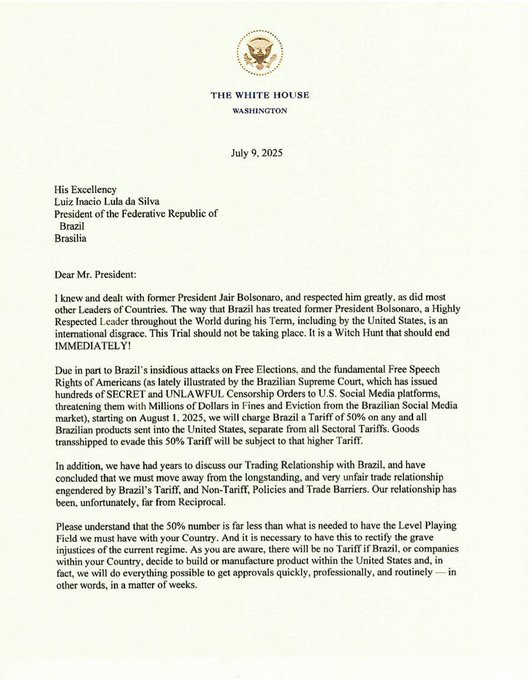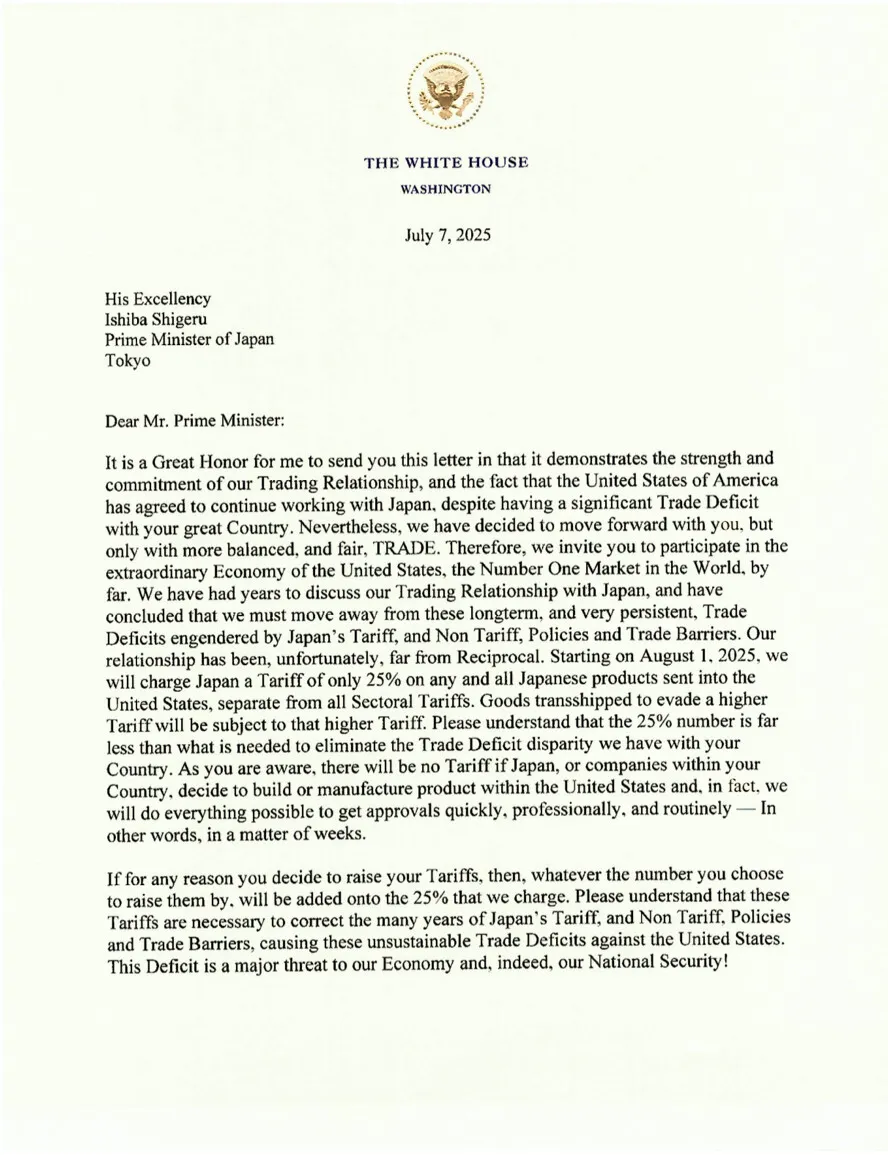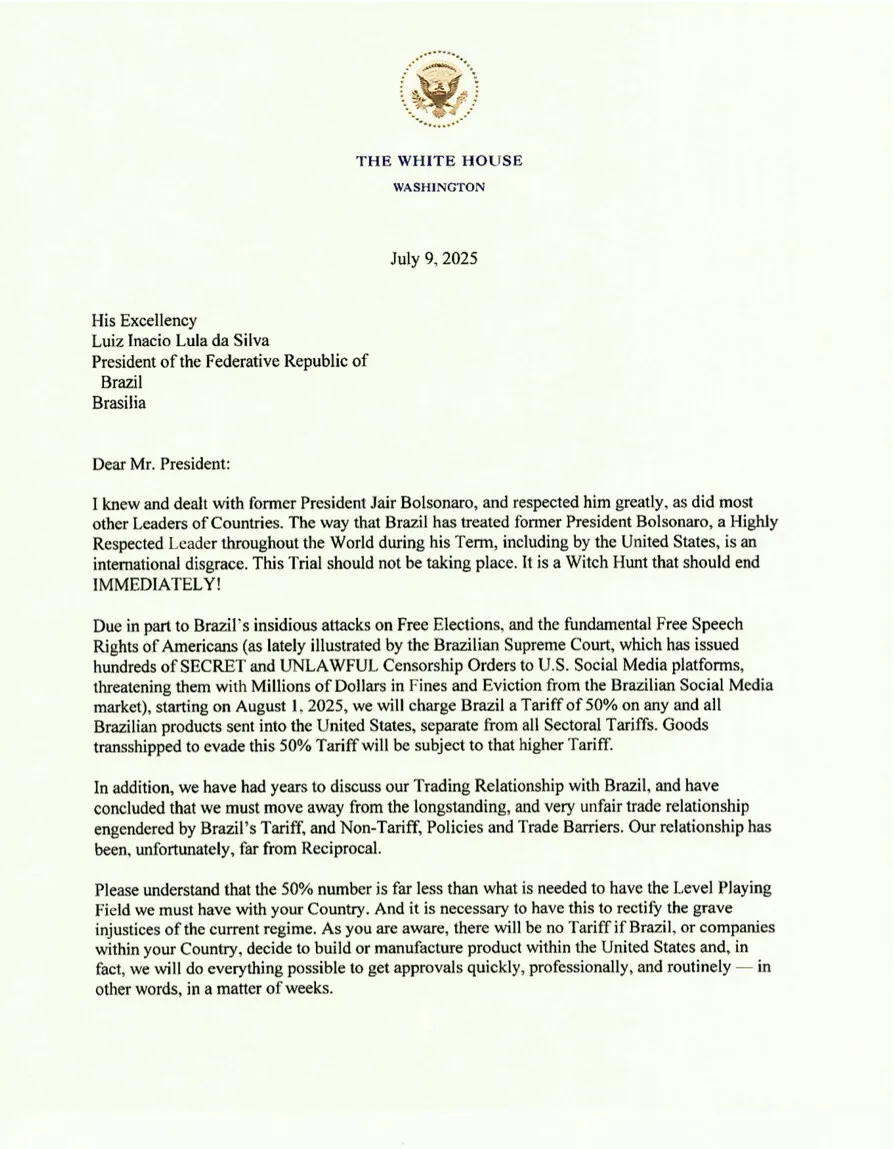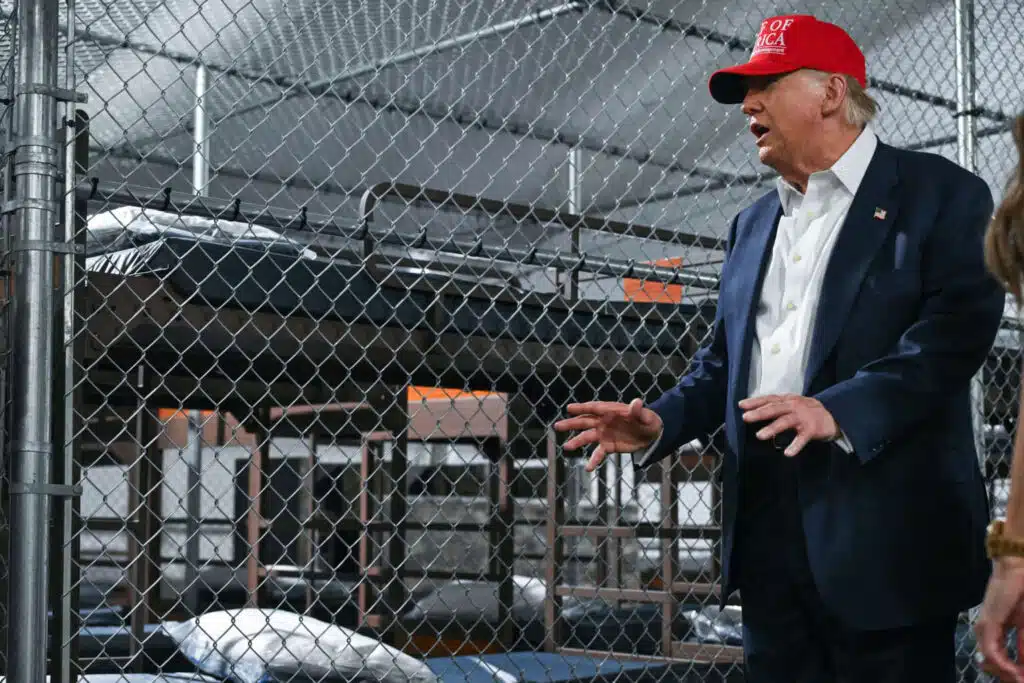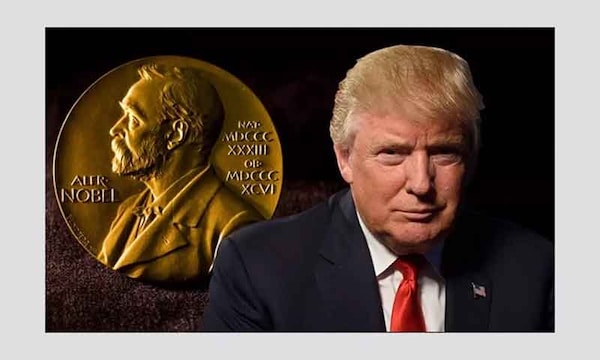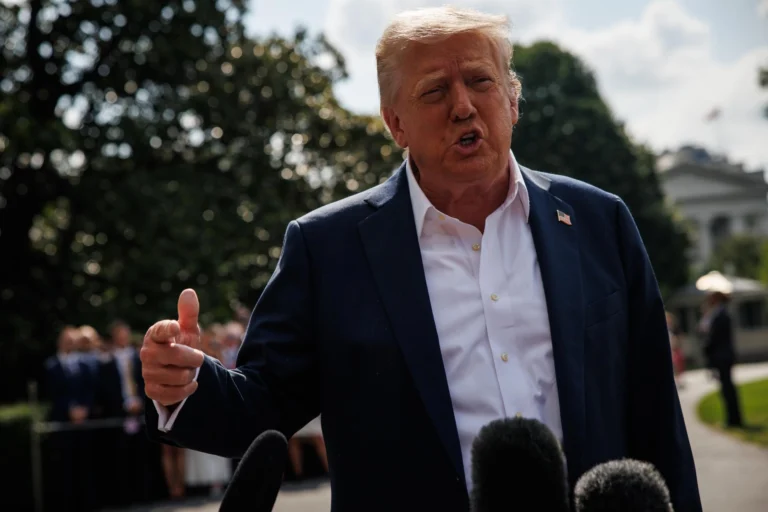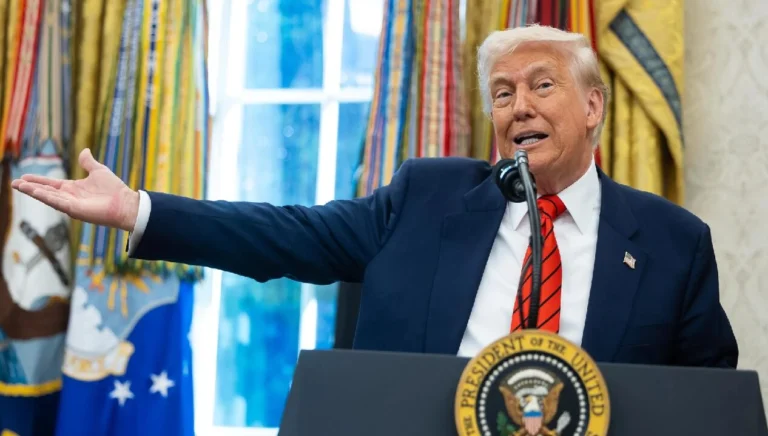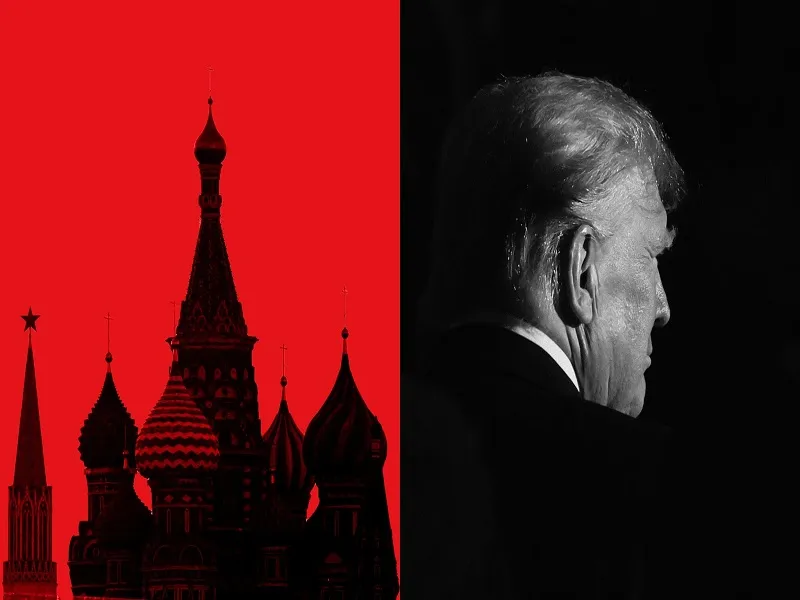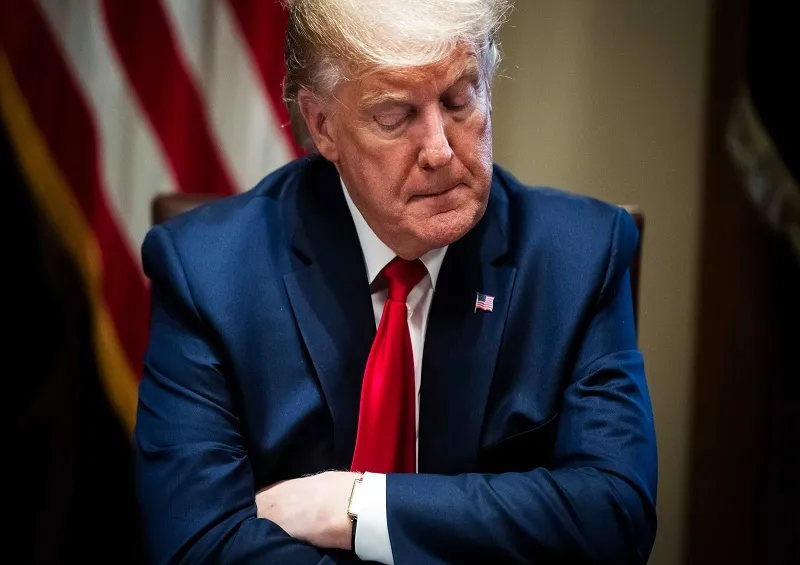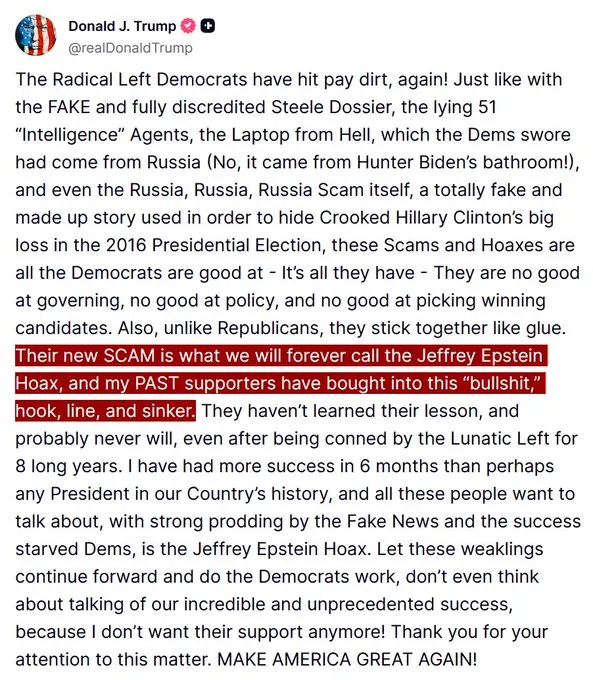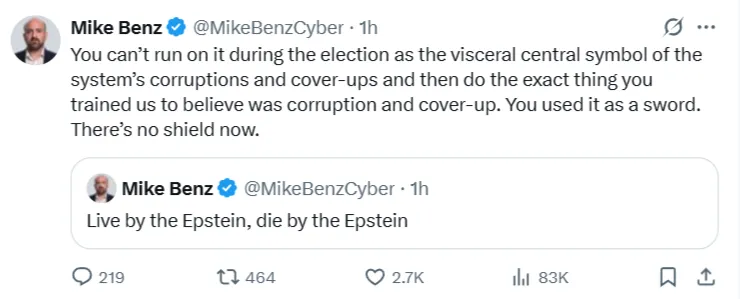
Big Beautiful Cover Up: Epstein, ICE, and the MAGA War State
Originally published: MintPress News on July 7, 2025 by Greg Stoker (more by MintPress News) | (Posted Jul 09, 2025)
The Department of Justice has quietly declared the Epstein case closed—no client list, no criminal conspiracy, and no further disclosures. Despite years of public pressure and speculation, the DOJ and FBI now assert that the contents of the Epstein files primarily involve sensitive victim information and materials that, if released, could endanger innocent individuals. In their view, the matter warrants no further investigation or transparency.
This abrupt conclusion follows months of political theater. Former Florida Attorney General Pam Bondi, now closely aligned with Trump loyalists, had claimed to be reviewing the Epstein files. Yet no public findings ever emerged from her office. Meanwhile, high-profile figures like Kash Patel, Trump’s ally director of the FBI, are positioned within the same agencies that would need to circumvent institutional barriers—including Bondi herself—to reveal any explosive information.
While public curiosity about Epstein’s elite connections remains strong, the most potent political uses of the case have already been extracted. The files became a symbolic lightning rod for anti-establishment outrage, especially within MAGA and QAnon circles. What began as calls for accountability evolved into a conspiracy-laden mythos, where Donald Trump was painted as the lone warrior fighting a network of global elites trafficking children. The absence of real disclosures didn’t undermine the story; it amplified the sense of hidden truth, driving engagement and radicalization.
A recent twist came when Elon Musk publicly implied that Trump’s name appeared in the Epstein files, only to later walk back his statements. Musk’s retraction came after Trump posted a statement from David Schoen—both Epstein’s former lawyer and Trump’s impeachment defense attorney—claiming no wrongdoing. Still, the optics of their past association continue to stir speculation, especially since Epstein once referred to Trump as a “close friend” in a 2017 interview, despite Trump later claiming to have distanced himself years earlier.
The DOJ’s final memo reveals a more disturbing subtext. It stresses that most of the unreleased Epstein material is tied to child sexual abuse and cannot be disclosed, not even partially. Yet this explanation, while framed as a defense of victim privacy, conveniently ensures no high-profile figures face scrutiny. The narrative arc concludes not with justice, but with silence.
As the Epstein discourse is effectively retired, new narratives are already being prepared to mobilize public emotion. Chief among them is the militarization of ICE under the guise of national security. With proposals to turn ICE into the third-largest armed force in the U.S., “terrorist sleeper cells” and “criminal migrants” are likely to become the next emotionally charged rallying cries. Behind these efforts are powerful private defense contractors like Palantir, with their predictive policing algorithms and expansive national databases, tools designed to secure profit through surveillance and incarceration.
The Epstein saga, rather than delivering justice, functioned as a political psyop—weaponizing disgust, redirecting rage, and channeling rebellion into electoral support for the very system it appeared to oppose. In the end, the performance of accountability overshadowed its need, and the machinery of the state continues to serve its true constituency: profit and power.
https://mronline.org/2025/07/09/big-bea ... war-state/
******
Trump Just Gave a Huge Gift to China’s Economy
Posted on July 9, 2025 by Yves Smith
Yves here. Trump’s fixation with trying to retreat into the past is producing even more destruction to the US than we would have suffered from the progress of imperial decline. This post describes how Trump’s “big beautiful bill” has all sorts of bennies for China.
By Dana Nuccitelli, research coordinator for the nonprofit Citizens’ Climate Lobby, and an environmental scientist, writer, and author of ‘Climatology versus Pseudoscience,’ published in 2015. He has published 10 peer-reviewed studies related to climate change and has been writing about the subject since 2010 for outlets including Skeptical Science and The Guardian. Originally published at Yale Climate Connections
On the Fourth of July – America’s 249th birthday – President Donald Trump signed into law a bill that could very well cede the country’s position as the leading global economic superpower to China.
As the nonpartisan energy think tank RMI has argued, the world is in the midst of a transition from the Information Age, which the United States led by dominating the development of new software and information technologies, to the Renewable Age, in which the development and deployment of electric and renewable energy technologies will drive the global economy.
This transition is dominated by insurgent clean technologies, such as solar, wind, electric vehicles, and batteries, whose prices are falling rapidly and whose growth is exponential.
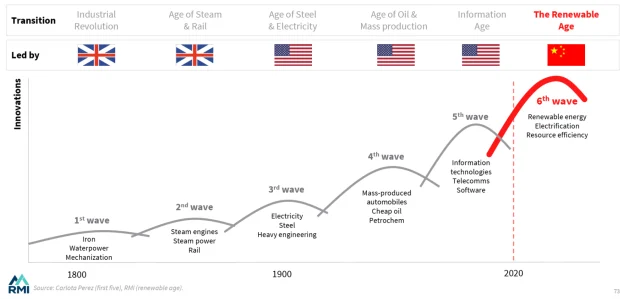
Transitions to new global economic ages and the countries that led and are poised to lead them. (Image credit: RMI / used with permission)
Chinese manufacturers have invested heavily in those technologies. To help the U.S. economy better compete in the clean tech sector, Democrats passed the Inflation Reduction Act, or IRA, in August 2022. That law included incentives to spur domestic manufacturing of these key clean energy technologies.
And it was working.
The U.S. experienced a clean energy manufacturing boom over the ensuing two years. But Republicans’ new budget reconciliation law, called the “One, Big Beautiful Bill Act,” guts those incentives and pulls the rug out from under nascent domestic clean energy industries.
On America’s birthday, President Donald Trump could not have given the Chinese economy a more generous gift.
Chinese Manufacturers Are Dominating the EV Market
The United States has the world’s second-largest car market, but EVs account for less than 10% of the country’s new auto sales. That can give U.S. residents the mistaken impression that EVs are unpopular.
In fact, more than one in five new passenger cars sold around the world in 2024 were electric. BloombergNEF, a market research firm, forecasts that this share will rise to about one in four new cars this year. That could rise to four out of every 10 by 2030, according to the International Energy Agency. In other words, the global auto market is increasingly electric.
China has the largest domestic auto market in the world, and half the new vehicles sold in the country today are EVs. And Chinese automakers are dominating the global EV market, offering a wide array of affordable and advanced cars. The electric car giant BYD’s cheapest model, the Seagull, is priced at less than $10,000, dramatically undercutting U.S.-based companies like Tesla.
Ford CEO Jim Farley recently described Chinese EVs as “far superior to what I see in the West.” He added that if his company loses the EV market to Chinese automakers, “We do not have a future Ford.”
Former President Joe Biden placed a 100% tariff on Chinese EVs to protect the U.S. domestic industry. And U.S. demand for EVs was expected to grow rapidly in the coming years as the result of federal tax credits for American-made electric cars and U.S. tailpipe pollution regulations.
But Republicans’ new budget law will terminate the former on September 30, and the Trump administration has gutted the latter.
As a result, energy systems modelers at Princeton and BloombergNEF project that only about half as many U.S. residents will buy EVs over the next five years as previously expected. By 2030, only about 27% of new car sales in the U.S. are now expected to be electric, compared to 80% in China.
Chinese Firms Are Winning the Solar Market, Too
The story is similar for solar panels. Solar energy is cheap, fast to deploy, and produces virtually no pollution during its operation. It accounted for about 70% of all new global power generation capacity added in 2024, including nearly 60% in the United States.
Chinese firms control over 80% of the global solar panel manufacturing supply chain, according to the International Energy Agency.
The IRA aimed to bolster the U.S. solar manufacturing industry, in part through clean electricity tax credits. But as a result of the Republican budget law’s rapid phaseout of those incentives, the U.S. will deploy about 40% less clean energy over the next decade, according to modeling by experts at Princeton. Companies like U.S. solar manufacturer Talon PV have already begun pausing or canceling U.S. projects in anticipation of the clean energy tax credit repeals, as well as other uncertainties like Trump’s unpredictable tariffs.
When the IRA became law, there was a surge in planned battery, EV, and solar manufacturing investments, according to a project to track clean energy manufacturing announcements by a team at Wellesley College. That was followed by a steep decline since last November’s elections and associated threats to clean energy incentives.
Energy Innovation, a Yale Climate Connections content-sharing partner, anticipates that the repealed clean energy tax credits will cost 760,000 jobs by 2030 and reduce the country’s gross domestic product by nearly a trillion dollars.
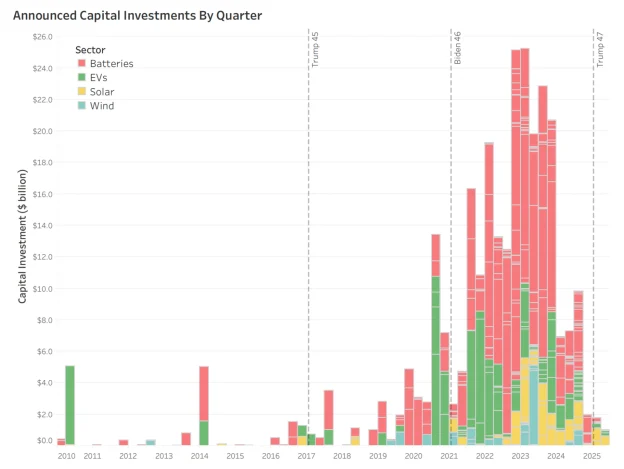
U.S. clean energy manufacturing project investments announcements by quarter. (Image credit: Wellesley College’s The Big Green Machine database / used with permission)
The Budget Reconciliation Law Gives the Chinese Economy Other Advantages
The big budget law will likely cause a tremendous number of other negative impacts. Because clean energy deployment will slow down at a time when power demand is rising rapidly and natural gas turbines are facing years of delivery backlogs, experts warn it will create energy scarcity. American companies will likely be left scrambling to find enough supply to meet rising power demand, which will lead to higher electricity bills and put U.S. artificial intelligence developers at a disadvantage in their high-stakes race against their Chinese competitors.
Increasing the country’s reliance on fossil fuels will also result in more air pollution and sicker U.S. residents, coinciding with at least 17 million people losing their health coverage and more than 300 hospitals facing the risk of closure, the result of other provisions in the GOP’s new law.
The Senate Made the Bill 25% Less Damaging to the Climate
As harmful as the final law is, it was very nearly considerably worse for the climate. The version initially passed by the House would have effectively immediately gutted the clean electricity tax credits. It was so damaging that 13 House Republicans pleaded with their Senate colleagues to fix the bill they had all just voted for.
The Senate Finance Committee did indeed make some improvements, softening the requirements for clean electricity to qualify for the tax credits and significantly extending their timeline for sources other than solar and wind.
Republican Senators Lisa Murkowski (Alaska), Joni Ernst (Iowa), Chuck Grassley (Iowa), and John Curtis (Utah) reportedly negotiated a last-minute amendment to the bill that added a one-year runway for new solar and wind projects to begin construction and still qualify for the full clean electricity tax credits.
The Princeton modelers estimated that compared to the status quo, the House version of the bill would have added about 2.7 billion tons of climate pollution to the atmosphere while increasing average U.S. household energy bills by more than $2,000 over the coming decade. The final bill passed by the Senate and signed into law by Trump is projected to instead add 2.1 billion tons of climate pollution and cost U.S. households a bit under $1,700 in higher energy bills over the next decade.
That’s about 25% less costly than the House version – both to pocketbooks and to the climate.
But it’s considerably worse than the status quo of Biden-era policies and regulations, in which the accelerated deployment of cheap solar and wind energy was expected to reduce household energy bills by about $600 over the next decade.
And on its new course, the U.S. will exceed its 2030 Paris commitment by 7 billion tons of climate pollution, according to an analysis by Carbon Brief.
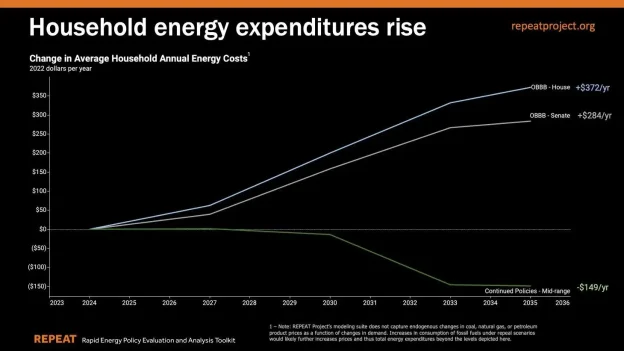
Average U.S. household annual energy costs under continued Biden administration policies (green), the proposed House budget bill (blue), and the Senate bill that Trump signed into law (gray). (Image credit: Princeton REPEAT / CC BY 4.0)
Given the slimmest of margins by which the bill passed the Senate, any Republican senator could have sent the bill back to the drawing board by simply voting no. Sen. Murkowski instead chose to cast the deciding vote after extracting a variety of concessions for her state and clean energy incentives, before pleading with the House to further fix the bill whose passage she had ensured.
A Bill Everyone Dislikes, Except Chinese Manufacturers
Because of the sprawling nature of the big budget law, it has something for just about everyone to dislike. And indeed, polls have consistently found that Americans oppose the bill by a nearly two-to-one margin.
Whether it be higher energy costs, lost domestic manufacturing, jobs, and economic growth, the ballooning of the national debt, energy scarcity, drastic cuts to the social safety net, exacerbated income inequality, or an extra 2 billion tons of climate pollution, there may only be one group that loves the big budget bill. As Energy Innovation’s Senior Director of Modeling and Analysis Robbie Orvis put it:
“To sum it up, this bill is a GIFT to China, which must be smiling right now watching what’s happening. We are gifting them the industries of the future, making the U.S. an eminently harder place to invest in, and decreasing our energy security.”
https://www.nakedcapitalism.com/2025/07 ... onomy.html
*******
Granted, It Is CNN.
But still, the audio is available. Donnie chose a very wrong country to threaten and fuck with.
Donald Trump told a private gathering of donors last year that he once sought to deter Russian President Vladimir Putin from attacking Ukraine by threatening to “bomb the sh*t out of Moscow” in retaliation, according to audio provided to CNN. “With Putin I said, ‘If you go into Ukraine, I’m going to bomb the sh*t out of Moscow. I’m telling you I have no choice,’” Trump said during one 2024 fundraiser, according to the audio. “And then [Putin] goes, like, ‘I don’t believe you.’ But he believed me 10%.”
Here is audio. (Audio at link.)
The news itself is not new, it is a good insight into Trump's psychology, though, and into his utter lack of statesmanship qualities. But somebody should have told him that "believing 10%" to something means that people know 100% that you are full of shit. He chose a very wrong man to get into the dick measuring contest with. Here are more details from Canadians.
As democracy is perfected, the office represents, more and more closely, the inner soul of the people. We move toward a lofty ideal. On some great and glorious day the plain folks of the land will reach their heart’s desire at last, and the White House will be adorned by a downright moron.
Prescient by Mencken.
http://smoothiex12.blogspot.com/2025/07 ... s-cnn.html
Excellent From Larry ...
... and Medvedev))
Sometime in the next decade, I think the publishers of Roget’s Thesaurus will include, “Trump” as a new synonym for erratic. Trump executed another of his signature volte face during a meeting with his cabinet.
Former Russian President Medvedev, wasted no time skewering Trump with this post:

Read the whole thing at Larry's blog.
http://smoothiex12.blogspot.com/2025/07 ... larry.html
******
Does Elon Musk’s third party have a prayer? Trump is not a believer
Robert Bridge
July 9, 2025
Elon Musk may find his effort to reach the Martian surface a much easier task than cracking the U.S. political system.
The U.S. leader dragged his former adviser over the coals after the tech mogul announced plans to bankroll the so-called America Party.
The wealthiest individual in the world announced the creation of the America Party in a series of weekend posts late on Saturday and early Sunday to X, formerly known as Twitter, the social media platform that is part of his private empire.
“When it comes to bankrupting our country with waste & graft, we live in a one-party system, not a democracy,” the South African native defiantly declared.
“Today, the America Party is formed to give you back your freedom.”
Musk, who was chosen to slash federal spending through the Department of Government Efficiency (DOGE) created by Donald Trump, has been an outspoken critic of the president’s “big, beautiful bill” that the non-partisan Congressional Budget Office said would increase the national deficit by $3.3tn (£2.85tn) through 2034.
Opponents of the ‘BBB’ say it provides major tax cuts for the ultra-wealthy, while slashing federal safety net welfare programs, with close to 11 million people forfeiting healthcare insurance.
The pair have sparred over the bill’s cost and consequences since Musk departed the government in May, and on Friday, when Trump signed his bill into law during a Fourth of July celebration on the White House lawn, Musk opened a poll on X: “Now is the perfect time to ask if you want independence from the two-party (some would say uniparty) system”.
Respondents voted two to one in favor of the plan, Musk announced late on Saturday. He provided journalists with scant details about the structure of his next big thing or a timeline for its future development. But his earlier posts suggested it would focus on two or three Senate seats, and eight to 10 House districts.
It’s a rather ingenious idea considering that both chambers of Congress are controlled by Republicans by a slim margin.
“Given the razor-thin legislative margins, that would be enough to serve as the deciding vote on contentious laws, ensuring that they serve the true will of the people,” Musk reasonably explained.
Trump scoffed at his former best buddy’s decision to start and fund a new U.S. political party, calling it “ridiculous” on Sunday. “Third parties have never worked, so he can have fun with it but I think it’s ridiculous,” the president told reporters traveling with him back to the White House aboard his helicopter Marine One after a day of whacking golf balls.
He then elaborated, at Trumpian length, in a post on his social media platform, Truth Social. “I am saddened to watch Elon Musk go completely ‘off the rails,’ essentially becoming a TRAIN WRECK over the past five weeks,” the president wrote. “He even wants to start a Third Political Party, despite the fact that they have never succeeded in the United States”.
“The one thing Third Parties are good for is the creation of Complete and Total DISRUPTION & CHAOS,” Trump added. The president then went on to claim that the Tesla and SpaceX chief was motivated by discontent over his plan to halt subsidies to promote the purchase of electric vehicles.
Musk, however, was not deterred by the U.S. president’s lengthy tirade, arguing rather naively that it would be “not hard” to break the two-party stranglehold in U.S. politics enjoyed by Democrats and Republicans. He went on to question “when & where should we hold the inaugural American Party congress? This will be super fun!”
But does the billionaire fully understand the depths of the swamp he’s getting himself into? By conservative estimates, Musk forked over about $275 billion of his personal fortune to get Trump elected for a second term in last November’s presidential race. While that may be mere chump’s change for the mogul, he will be expected to spend much more to shake up the petrified power structure now dominating Capitol Hill (While there is no requirement for new political parties in the U.S. to register with the Federal Election Commission (FEC) at the start of the process, reporting regulations begin once spending surpasses what the FEC calls “certain thresholds”). And let’s face it, Trump is right. America has never enjoyed a third choice for very long, and with very little success when those moments arrived.
With few exceptions, the U.S. political system has two major parties which have won, on average, 98% of all state and federal seats.
“The United States stands out among the world’s democracies for having an unusually small number of competitive parties;” Seth Masket wrote in Democracy. “[a]nd for such a large, diverse, and multiethnic society to have just two dominant parties means that those parties will be strikingly vast, complex, heterogeneous coalitions.”
Musk should be familiar with Duverger’s law, which holds that in political systems with single-member districts and the first-past-the-post voting system, as in, for example, the United States and Britain, only 2 powerful political parties tend to control power. Citizens are encouraged not to vote for third party spoilers because, as the reasoning goes, they will just split votes away from the major party. Such a model diverts sharply from the European system where citizens are actively encouraged to create, join and vote for new political parties if they are unhappy with current choices. Such thinking is practically unheard of in the United States.
And try to wrap your head around this riddle: in the 1992 U.S. presidential election, Ross Perot’s independent run received zero electoral votes despite receiving 19% of the popular vote, the most won by a non-major-party presidential candidate since Theodore Roosevelt in 1912. Perot remains the only non-major-party presidential candidate since George C. Wallace in 1968 both to win counties and to finish as high as second place in any state.
And then the America Party will inevitably face the formidable firewall known as the U.S. media, which dutifully serves its powerful masters, i.e., those two heads of the same snake wielding the greatest political clout. It gets better. They are propped up by a shady organization known as the Commission on Presidential Debates (CPD), a nonprofit corporation established in 1987 under the joint sponsorship of the Democratic and Republican political parties in the United States. Yes, you read that right. The organization created to ensure fair play and equal access to various resources (primarily in the media) during the debates is owned lock, stock and barrel by the two-party monopoly.
In 1985, the bipartisan National Commission on Elections recommended “[t]urning over the sponsorship of presidential debates to the two major parties”. The CPD was established in 1987 by the chairmen of the Democratic and Republican Parties to “take control of the presidential debates”.
Against such formidable odds, Elon Musk may find his effort to reach the Martian surface a much easier task than cracking the U.S. political system, constructed as it is in layers of formidable protection to guard against pesky ‘outsiders.’
https://strategic-culture.su/news/2025/ ... -believer/








